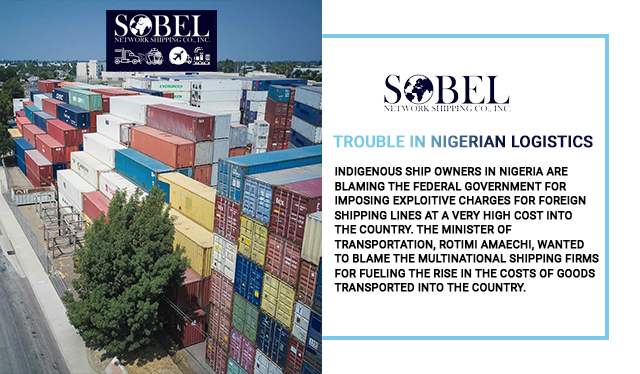Indigenous ship owners in Nigeria are blaming the federal government for imposing exploitive charges for foreign shipping lines at a very high cost into the country. The Minister of Transportation, Rotimi Amaechi, wanted to blame the multinational shipping firms for fueling the rise in the costs of goods transported into the country. But according to the indigenous operators, the government has only succeeded in creating an enabling environment for foreign shipping companies to make a profit out of the Nigerian market. This, in turn, has paralyzed the capabilities of indigenous ship operators through policies, unfriendly business climate, and lack of funds to empower citizens to acquire vessels.
The cost of logistics in Nigeria is not only the highest in the region, but according to the GCI 2019, it was ranked 116th with a score of 48.3 compared to South Africa which was ranked 60th with a score of 62.4. Between 2015 and 2019, Nigerians had paid $45 billion in freight charges to foreign shipping firms, an average of $9 billion lost annually. CEO of Panafric Ocean and Energy Limited, Turkish Brown, stated that no Nigerian owns any cargo ships that berth on the country’s waters, and that foreigners take advantage of this gap to maximize profit at the detriment of the country and its citizens. Most other places, the government protects their citizens by denying foreigners to operate unchallenged in their waters, these foreign shipping companies do their business in Nigeria without contest. The situation where no administration has empowered its people to acquire vessels or empower indigenous operators to come up with an alternate arrangement, has left the citizens at the mercy of foreign ship owners who thereby expose the outrageous shipping costs and surcharges.
Some foreign firms manage to label Nigeria as a war risk zone, using the insurance element to increase freight charges without the Nigerian government doing anything to address this. Other countries in Europe, America, and Asia pay 0.5 per cent in freight insurance. Nigeria pays 1.5 per cent with no choice of negotiation because there are no indigenous vessels to transport their cargo. The majority of this cost is said to come from the War Risk Insurance premium slammed on Nigeria-bound cargoes by foreign insurance firms. If this was removed, it would bring down the cost burden on Nigerian Importers and exporters. This was the result of the immediate fallout of the collapse of the nation’s shipping line, and the inability of the private sector to fill in the gap. Foreign shipping lines and cargo underwriters capitalized on the situation and imposed freight charges and war risk insurance, which is almost exclusively applicable to Nigerian cargoes.
Brown said ship operators have been working on the possibility of setting up a Maritime Fund in the past 5 years in order to pull together $500 million to enable indigenous operators to acquire assets for operations and other ancillaries for the industry. There are hopes it will come to fruition by early next year.
Managing Director of Seajammer Vessel Management Limited, Josiah Wasa, stated the government was responsible for the $45 billion lost in freight to international shipping firms that bring cargo inbound to Nigeria. He also added that consumers were paying for the high freight charges indirectly as the cost of goods kept skyrocketing. Wasa stated the factor responsible for the increased prices of petroleum products is the high cost of freight and not subsidy, which the government is using as an excuse. The country brings in petroleum products from outside because their refineries are down. When the ships bring in the products, they have to pay for the freight, insurance, landing costs, as well as the cargo on board.. The federal government, however, is not reaping much from its crude sales as the nation continues to buy refined crude due to the state of its domestic refineries.
He also said Nigeria is unable to have indigenous ships move its cargo due to political factors, namely having the wrong people driving the industry. “If you don’t understand the geography of shipping, it will be difficult for you to get it right,” Wasa says. “If you don’t understand how shipyards are configured or how you can acquire ships from the shipping market, there is no way you can fit in. You can’t just bring in anybody, especially a politician to come and head the maritime industry and that is where we have got it wrong. We have the wrong leaders given to us in the sector.”
Understanding and being able to articulate challenging destinations like Nigeria is what makes Sobel stand out from the competition. We help companies respond to global opportunities while taking steps to prevent unwanted surprises along the way.


